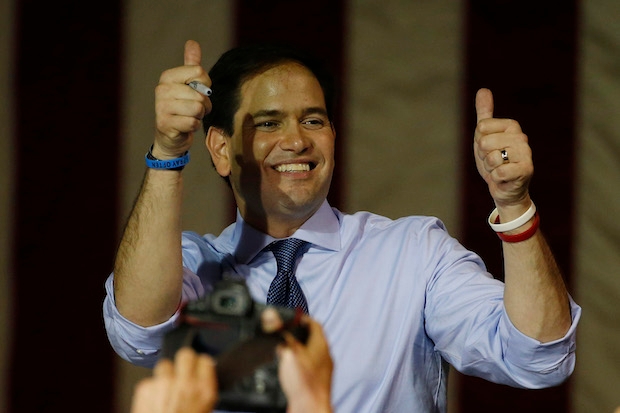Marco Rubio last night finally suspended his campaign. At the risk of sounding smug, I could have told you years ago that he was not a good presidential candidate. In the wake of Barack Obama’s re-election in 2012, Rubio went on a charm tour of London, where I met him.
He was sharp, no doubt about it, and agreeable in a way. His mind seemed to work very fast. But his speech and manner were weirdly automatic. It was as if a programmer had typed the following instructions into his head: ‘Visiting centre-right British magazine. Engage/deploy Thatcher-Reagan freedom rhetoric. Stress importance of Special Relationship. Attack Barack Obama.’
For twenty minutes or so, he mechanically went on. Reagan; Thatcher; Reagan; Freedom; Reagan; Thatcher; Freedom; America; Thatcher; Obama bad; Special Relationship good.
There was a strange moment towards the end of our meeting, when somebody asked Rubio about Obama’s attempts to cut a nuclear deal with Iran. He said how disgraceful and un-American the president’s behaviour was and repeated that the Mullahs in Tehran were enemies of freedom-Thatcher-Reagan-America and so on and on. So far, so boilerplate. But then, discussing the role of Angela Merkel in negotiations, Marco went off script. He looked confused and asked the assembled journalists around the table why Germany had such a ‘pacifist’ political culture. There was a long pause. ‘Er, I can think of one or two reasons,’ said one of us, referring to two not insignificant wars in the 20th century.
It came as no surprise, then, to see Rubio’s 2016 campaign fall flat. His automaton quality became obvious to everyone, especially in that now notorious New Hampshire debate when he repeated the same sentence about Barack Obama four times in less than two minutes. He developed nicknames such as Marco Robotio and the Talking Haircut.
In his resignation speech last night, Rubio suggested he was the right candidate at the wrong time. He said the electorate was too angry to listen to his ‘hopeful and optimistic message’. That’s at least half-right. If Donald Trump is, as many journalists have written, the Republican Party’s Frankenstein, Marco Rubio is the experiment that turned out too well. In a time of anti-politics, he was suspiciously perfect-looking: handsome, young, Hispanic, a cheerleader for a wife, the humble-roots backstory.
But Rubio’s problem wasn’t just that he was too pristine a politician for a cynical age. His campaign always had a bizarre wrongheadedness about it. His message was conceited yet hopeless. While Marco mocked the outgoing President in his stump speeches for ‘leading from behind’ in his foreign policy, his staff talked about how they could win the Republication nomination from behind. They kept insisting that they had a clever path to victory, which nobody else could quite see. But the obvious historical truth is that you cannot hope to win if you cannot win state primaries. Rubio’s only campaign victory was minor, the Minnesota caucus.
Even after Super Tuesday, on March 1, when it was obvious to anyone with a pulse that his candidacy was finished, he refused to accept he had failed. He made out that he was absolutely determined to save his party from the nightmare of Donald Trump. But by staying in the race up until last night, he carried on splitting the anti-Trump vote, ensuring that the Donald won states that he would not have otherwise won. In a number of tight contests, such as North Carolina and Missouri last night, Rubio’s votes almost certainly stopped Ted Cruz from beating Trump. He clung on to the hope that he would win in Florida, his home state, but then of course he didn’t.
Earlier this month, Rubio attempted the impossible and tried to out-nasty Trump. The robot put itself on ‘coarse’ mode. He made that joke about Donald Trump having small hands, and ‘you know what they say about men with small hands.’ But Republicans thought that a real man would not stoop so low, and carried on voting for Trump.
To his credit, however, Rubio did make one good joke, knocking Trump’s ‘Make America Great Again’ slogan. ‘Donald Trump isn’t going to make America great,’ he said. ‘He’s going to make America orange.’ That line just about sums up this year’s super surreal Republican nomination process.







Comments